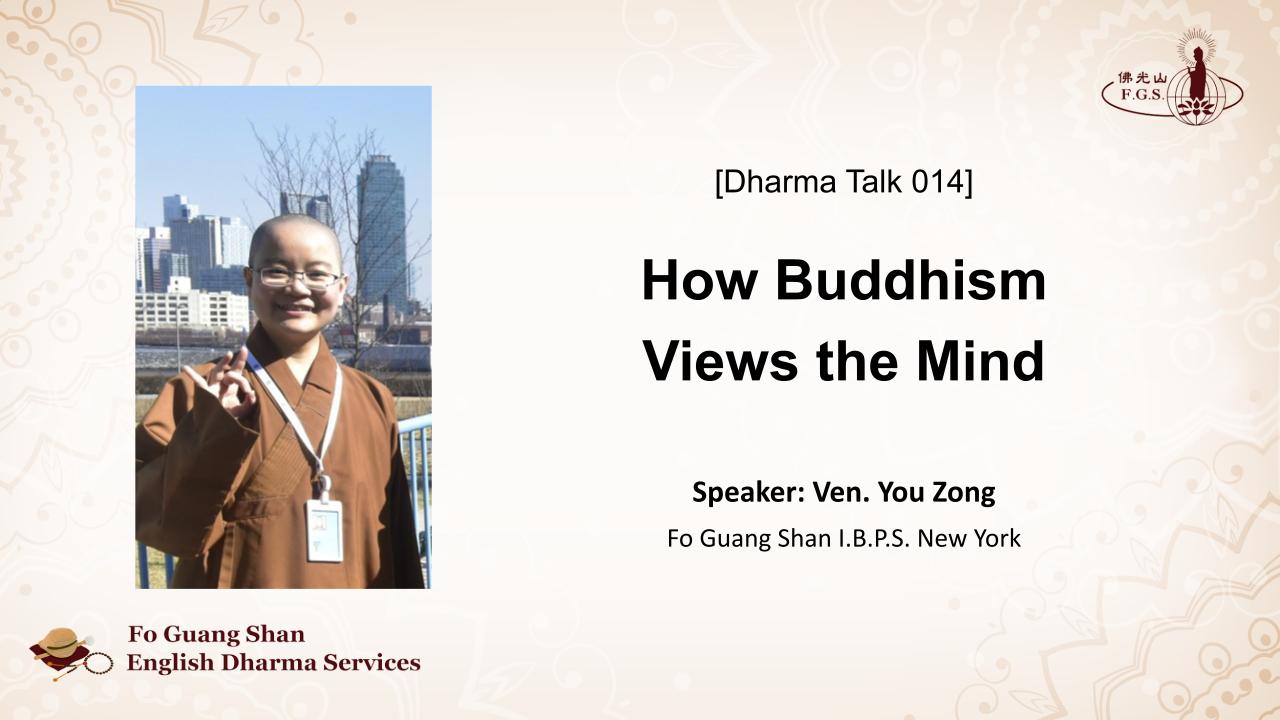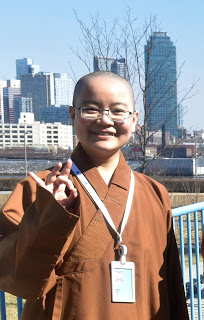
Speaker: Ven. You Zong
Fo Guang Shan I.B.P.S. New York
I. Introduction
Auspicious greetings to our friends all around the world. This is You Zong from I.B.P.S. New York. Thank you for joining us in this online English Dharma Service session. We hope that the talks find you well.
Today, I would like to share with you a topic entitled, “How Buddhism Views the Mind.” Let me start with a little Chinese idiom story.
There was an archer who came to the town. He was famous. And he was exhibiting his talents. He was showing off. He was wonderful. Because he was able to pierce a willow leaf with an arrow from a distance of a hundred paces. And every shot struck. The crowd gave me a round of applause and cheered him on.
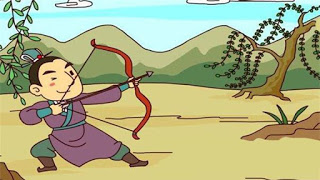
But there was an old man, standing back at the crowd. Instead of cheering him, he kept saying, “Just the matter of practice. Just the matter of practice.”
The archer definitely did not like the comment. He was expecting praise, instead of comments. He turned off and ran over to the old man. “What do you mean? Can you do what I did?”
“No,” the old man replied. “But let me show you something.”
The old man used to sell oil. He took a bottle with a very narrow opening, a long tube, and a bowl at the bottom. He was able to tip the oil and pour the oil right through the opening to the bottom, and not a drop of the oil spilled. He looked at the archer and asked, “Can you do that?”
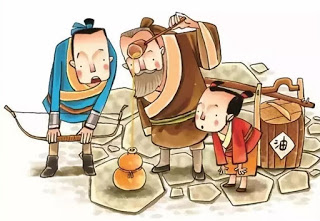
“Definitely.” The archer realized that he couldn’t do that. Because he hadn’t practiced anything like that.
The old man said, “I can’t shoot the arrow like you, and you can’t pour the oil like me. It’s the matter of practice.”
Now, my question to you is: what do you practice? How many times have you heard someone complain about the weather? Or have you ever noticed yourself getting cranky with the same guy at work over and over? Or perhaps you know someone who has transformed their life positively and grow beyond old habits?
So, what do you practice? Whatever you practice, you will get good at. If a person practices cheat and deceit, they are going to get good at cheat and deceit. If a person practices complaining, they will get very good at complaining. They will be able to complain about everything, without having a second thought. It would be a flow. Some people have gotten used to complaining about their boss’s attitude, the work schedule, their partner always being late, about not having enough time, or about their partner always complaining. So, the question again is, what do you practice in your life?
II. The Storehouse Consciousness
You might not be able to answer my question right away. In fact 40% of our actions or daily practices are not our conscious decision but habits. So habits are a big part of our life and a lot times we don’t even realize it.
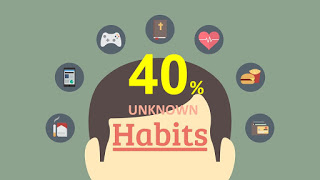
The Buddhist concept of the storehouse-consciousness arose more than 2,000 years ago, explain why people so often return to the same emotional state and viewpoint. The Consciousness-Only School defines habitual tendencies as the process of “planting seeds in the store consciousness.”
The Store consciousness, sometimes called the“alaya-consciousness.” It is like a store house full of past memories of love, hatred, good will, et cetera, which we may no longer recall in this life, but it will continuously influence our actions and behavior in the present life.
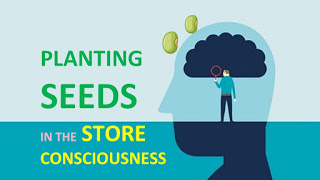
The Consciousness-Only School says that, “Whatever we see, we hear, we taste, we smile we touch, or imagine, all will be stored in the alaya consciousness.” It can be associated with planting a seed in soil. These seeds can be active or remain sleepy. While certain conditions arise, bringing these seeds into growth and fruition. When unwholesome seeds from the past mature, we become afflicted, and attempt to commit unwholesome deeds, which in turn plant new unwholesome seeds for the future. When wholesome seeds from the past mature, our hearts are pure and noble, our minds are clear and intelligent, and will again perform wholesome deeds that become wholesome seeds in the alaya-consciousness. The cycle of this unconscious level cycle of experience is where the habits are formed and held. The more seeds we plant of the same kind, the stronger the impulse to act in that way becomes.
In the teaching of the Consciousness-Only School, it is said, “Seeds give rise to actions, then actions turn into new seeds.” The psychological motive of all human behaviors are explained through this model. Due to the influence of ignorance that we carry with us from the past, we are prone to making judgments that result in negative feelings. Reinforced by greed and anger, our mind becomes confused and forms incorrect views about things in the world. However, just as plants require sunshine and rain to blossom to bear fruits, similar conditions are required for the development of human behavior.
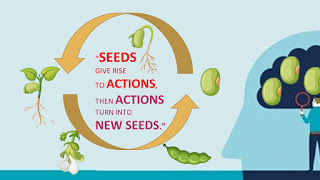
Although the feeling of love, hatred, and positive or negative intention lies in deep in the subconscious of all humans, when these feelings are provoked by the people or things that surround us, we must rely on our true minds and wisdom to avoid committing negative deeds and conduct ourselves virtuously instead.
Supposed you type something on the computer, and this information is stored on the hard drive, that hard drive is like a store consciousness. Although the information does not appear on the screen, it is still there. When you click, it will manifest. The seeds in store consciousness are like the date you store on your computer. If you want to, you can click, and have it appear on the screen of mind consciousness. Mind consciousness is like a screen, and store consciousness is like a hard drive because it can store a lot in it.
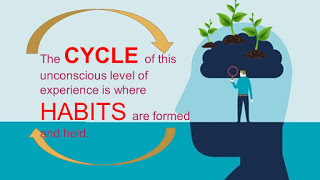
Store consciousness has the capacity of storing, maintaining, and preserving information. Just like information on a hard drive, however, all the seeds are often organic nature and they can be modified. The seed of hatred, for example, can be weakened and its energy can be transformed into the energy of compassion. The seed of love can be watered and nurtured. The nature of the information that is being kept and processed by the store consciousness is always flowing and always changing. Love can be transformed into hate, and hate can be transformed back into love. The important thing here is that we should be very careful about what we are seeing, hearing, smelling, touching, tasting, or imagining, because all these seeds are being planted for future reference.
III. Planting Seeds in the Consciousness
Some people said that there is no harm in letting their children play violent video games. But I would beg to differ. Those violent seeds are being planted in their store consciousness. According to two studies appearing in April by the American Psychological Association’s Journal of Personality and Social Psychology, it states:
Playing violent video games can increase a person’s aggressive thoughts, feelings, and behavior both in the laboratory setting and actual life. Furthermore, violent video games may be more harmful than violent televisions and movies, because they are interactive, very engrossing, and require the player to identify the aggressor.
The seeds we plant in the past are portrayed as karmic seeds and the way they manifest in the here and now is the karmic fruit. So, the more you act in a certain way, the more you practice, the stronger the imprint is, and this will exhibit itself as a habit.
By being mindful of what is being experienced by the Six Consciousness, we can let go of harmful seeds and cultivate healthy ones. In this way, we can transform the store consciousness instead of blindly being swept along with it.
IV. Fifty-One Attributes of the Mind
The Consciousness-Only School further classifies the psychological responses of human beings into 51 categories. I refer them as the attributes of the mind. These include:
1. Five basic psychological functions:
- Mental and physical contact
- Attention
- Feeling
- Identification
- Analysis
2. Five intentionally created mental conditions:
- Aspiration
- Comprehension
- Memory
- Concentration
- Wisdom
3. Eleven wholesome psychological states
- Trust
- Diligence
- Humility
- Remorse
- No greed
- No hatred
- No ignorance
- Tranquility
- Attentiveness
- Equanimity
- Harmlessness
4. Six root afflictions
- Greed
- Hatred
- Ignorance
- Arrogance
- Doubt
- Incorrect views
5. Twenty unwholesome psychological states
- Anger
- Hostility
- Irritation
- Conceit
- Deceit
- Flattery
- Arrogance
- Malice
- Jealousy
- Stinginess
- Remorselessness
- No regret
- No trust
- Laziness
- Insensitivity
- Apathy
- Agitation
- Forgetfulness
- Incorrect perception
- Heedlessness
6. Four neutral states of mind
- Remorse
- Sleepiness
- Applied thought
- Sustained thought
V. Conclusion
In conclusion, the process transform a deluded mind into true mind depends on your everyday practice. This is described in Buddhism as “converting consciousness into wisdom.” The wisdom emitted from the true mind is the therapy or treatment that humans can use to resolve internal conflicts within their minds, to transcend the suffering in this lifetime, and to break free from the cycle of birth and death in future lives.
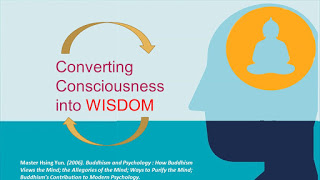
That’s all my sharing for today. Thank you for joining us in this cultivation session. Let us join our palms and dedicate the merits to all sentient beings in the universe May everyone in the world be safe and happy. See you next week. Omitofo.

